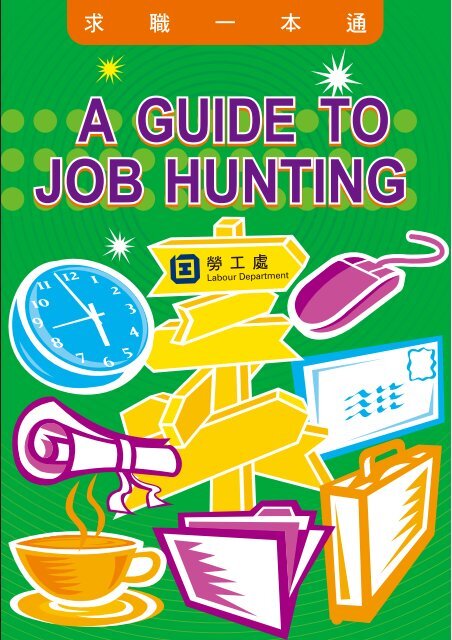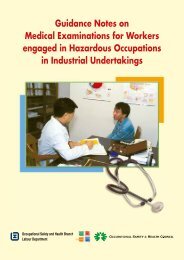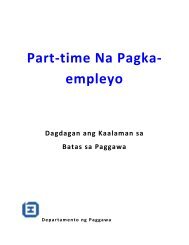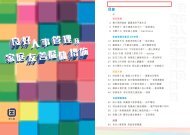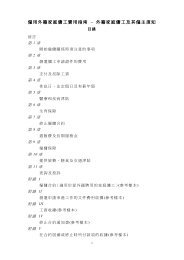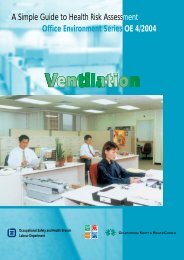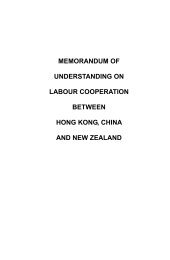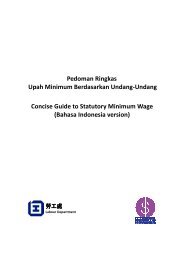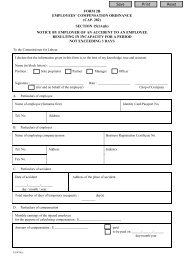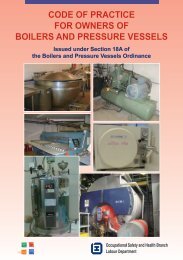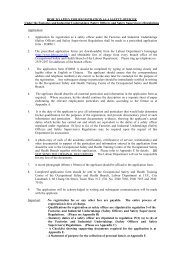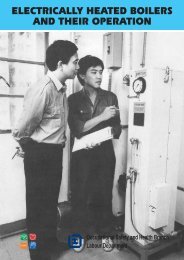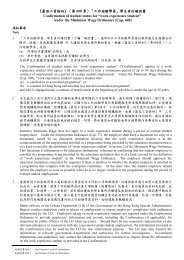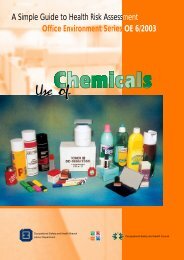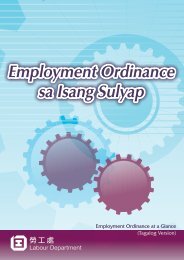A Guide to Job Hunting
A Guide to Job Hunting
A Guide to Job Hunting
You also want an ePaper? Increase the reach of your titles
YUMPU automatically turns print PDFs into web optimized ePapers that Google loves.
A GUIDE TO<br />
JOB HUNTING
Content<br />
Foreword<br />
1<br />
<strong>Job</strong> <strong>Hunting</strong><br />
Know yourself and know others<br />
Ways <strong>to</strong> collect vacancy information<br />
<strong>Job</strong> Application<br />
Contact employer direct by phone<br />
Writing application letter and résumé<br />
Email sample<br />
Application letter sample<br />
Résumé sample<br />
Interview<br />
Interview formats<br />
Preparation for the interview<br />
Interview performance<br />
Questions frequently asked during the interview<br />
Interview follow-up and evaluation<br />
Beware of Employment Traps<br />
Common employment traps<br />
Detecting employment traps<br />
Conclusion<br />
Acceptance of appointment<br />
Facing the new job<br />
2<br />
3<br />
6<br />
7<br />
10<br />
11<br />
13<br />
15<br />
16<br />
19<br />
21<br />
24<br />
26<br />
27<br />
29<br />
30
Foreword<br />
The current job market is highly competitive. To stand out from<br />
all the job seekers and <strong>to</strong> gain success in job hunting, you have<br />
<strong>to</strong> acquire good job-hunting skills apart from having the ability<br />
<strong>to</strong> take up the job.<br />
Through this <strong>Guide</strong>, we hope <strong>to</strong> help job seekers master the<br />
basic skills of job hunting, thereby enabling them in overcoming<br />
all the hurdles and finding a suitable job. Topics covered in this<br />
<strong>Guide</strong> include tips on job hunting, skills on writing application<br />
letters and résumés, points <strong>to</strong> note before and during an interview,<br />
and how <strong>to</strong> detect employment traps etc.<br />
Employment Information and Promotion Programme<br />
Labour Department<br />
1
<strong>Job</strong> <strong>Hunting</strong><br />
Know yourself and know others<br />
"What kind of job should I look for?" The so-called "know yourself and know<br />
others" means job seekers must understand themselves and the labour market <strong>to</strong><br />
avoid wasting time or missing any employment opportunities.<br />
Know yourself – Understand yourself<br />
This is the first step in job hunting. <strong>Job</strong> seekers should clearly understand their<br />
own personality traits and job preference, and choose their job accordingly;<br />
You can understand yourself better through<br />
analysing and reviewing various aspects like your<br />
personality, interests, ability, merits, qualifications,<br />
job preference and job expectation. Knowing<br />
yourself will not only help you establish your<br />
career goal and choose a suitable job, but also<br />
in answering questions during interview.<br />
Know others – Understand the prevailing<br />
labour market and industry situation<br />
Apart from understanding yourself, you should pay attention <strong>to</strong> changes in the<br />
labour market and analyse the prevailing job market situation, so as <strong>to</strong> set a<br />
realistic target for job hunting;<br />
The labour market changes frequently and rapidly. To get employed, you<br />
should be ready <strong>to</strong> make adjustments accordingly. The latest market<br />
information can be obtained through different channels including<br />
newspapers, magazines, electronic media as well as Internet;<br />
In addition, you should keep abreast of the development of various trades and<br />
industries, and have a better understanding of their recruitment channels,<br />
entry requirements for various positions as well as prospects and potential for<br />
long-term development. You then have better equipped yourself and<br />
prepared <strong>to</strong> face challenges ahead.<br />
2<br />
Know Yourself<br />
Know Others
<strong>Job</strong> <strong>Hunting</strong><br />
Ways <strong>to</strong> collect vacancy information<br />
With proper use of various job-searching channels, you can access vacancy<br />
information and increase your chance of success. You can collect vacancy<br />
information through the following means:<br />
Employment service of the Labour Department<br />
The Labour Department provides free and user-friendly employment service<br />
<strong>to</strong> help job seekers secure suitable jobs. A comprehensive range of services<br />
are provided <strong>to</strong> job seekers through its <strong>Job</strong> Centres, Interactive Employment<br />
Service website, “Interactive Employment Service” mobile applications and<br />
Telephone Employment Service.<br />
Interactive Employment Service Website:<br />
http://www.jobs.gov.hk<br />
Telephone Employment Service Hotline: 2969 0888<br />
“Interactive<br />
Employment<br />
Service”<br />
mobile<br />
applications<br />
<strong>Job</strong> seekers can make use of the facilities installed at the<br />
<strong>Job</strong> Centres including telephones, fax machines,<br />
user-friendly vacancy search terminals and computers<br />
with Internet functions <strong>to</strong> search for suitable vacancies<br />
and prepare résumés and application letters. <strong>Job</strong> seekers<br />
may get job referrals from the <strong>Job</strong> Centres or Telephone<br />
Employment Service Centre, or approach employers directly if their<br />
contact means are printed on the job order cards.<br />
T<br />
Vacancy Search Terminals are also installed in various offices of Home<br />
Affairs Department, Social Security Field Units, Housing Department,<br />
Employees Retraining Board Service Centres and Non-Government Organisations<br />
providing employment services.<br />
3
<strong>Job</strong> <strong>Hunting</strong><br />
Newspapers and magazines<br />
Recruitment advertisements on job vacancies of private establishments and<br />
public organisations.<br />
Internet<br />
Interactive Employment Service website: http://www.jobs.gov.hk;<br />
Employment websites: job vacancies of private establishments and public<br />
organisations;<br />
Some companies also post up job vacancies on their own websites;<br />
Civil Service Bureau website: http://www.csb.gov.hk (Government job vacancies<br />
are uploaded here).<br />
Private employment agencies<br />
<strong>Job</strong> referrals for job seekers;<br />
According <strong>to</strong> the Employment Agency Regulations, employment agencies<br />
should not charge the job seekers any fees other than commission, and for<br />
each successful placement, a commission not more than 10% of the first<br />
month’s wages could be charged from a job seeker.<br />
Large –scale job fairs/recruitment days<br />
The Labour Department regularly organises large-scale job fairs for employers<br />
and job seekers. <strong>Job</strong> seekers may apply for jobs with participating employers.<br />
Employers would accept direct job applications and some may conduct job<br />
interviews on the spot as well;<br />
4
<strong>Job</strong> <strong>Hunting</strong><br />
<strong>Job</strong> Centres, Recruitment Centre for the Catering Industry and Recruitment<br />
Centre for the Retail Industry of the Labour Department also regularly organise<br />
regional or targeted trade job fairs for employers and job seekers.<br />
Participating employers would accept direct job applications and conduct<br />
on-the-spot job interviews;<br />
Some companies organise their own recruitment days. <strong>Job</strong> seekers may attend<br />
such recruitment activity and submit their applications/attend interviews at<br />
the designated dates, time and venues.<br />
Referrals by your family members or friends<br />
Your friends and relatives may be able <strong>to</strong> get job interviews or referrals for you.<br />
Recommend yourself <strong>to</strong> potential employer<br />
Write <strong>to</strong> companies or organisations and apply for posts you are interested in<br />
even if they have not placed any recruitment advertisements;<br />
You may learn about the business activities and<br />
structure of a company from its website and<br />
annual report. After conf irming the name<br />
and post title of the staff in charge of<br />
recruitment, you can write <strong>to</strong> him directly <strong>to</strong><br />
apply for a suitable post.<br />
5
<strong>Job</strong> Application<br />
The application method such as application via telephone, interview by<br />
appointment and submission of an application letter and résumé are usually set<br />
out in the recruitment advertisements. If a suitable vacancy is advertised, you<br />
should submit an application promptly.<br />
Contact employer direct by phone<br />
When making a call <strong>to</strong> the person taking charge of recruitment, you should:<br />
choose a quiet place <strong>to</strong> contact the potential<br />
employer, and bring along a pen and a piece of<br />
paper <strong>to</strong> jot down simple notes;<br />
briefly introduce yourself and explain the<br />
purpose in your call;<br />
Résumé<br />
Application<br />
Letter<br />
state clearly the post you want <strong>to</strong> apply and the source of vacancy<br />
information;<br />
be calm, polite and conf ident;<br />
jot down clearly details such as date, time and place of interview, contact<br />
person and documents <strong>to</strong> be brought along if you are granted an interview;<br />
confirm the arrangement of interview and express your gratitude before<br />
ending the telephone conversation;<br />
should there be no vacancy available at the moment, you may try <strong>to</strong> leave your<br />
contact means so that the company could contact you easily thereafter;<br />
stay on the line and let the potential employer hang up f irst.<br />
6
<strong>Job</strong> Application<br />
Writing application letter and résumé<br />
After posting a recruitment advertisement, the employer will receive a lot of<br />
application letters and résumés. To secure an interview, apart from possession of<br />
the qualif ications as required by the employer, you need <strong>to</strong> submit a well-written<br />
application letter and a résumé that help you stand out amongst all applications<br />
and create a good impression on the recruiting employer.<br />
Before writing...<br />
You should<br />
understand the qualif ications and requirements of the post for preparing<br />
a tailor-made application letter and résumé;<br />
list your qualif ications f irst<br />
such as education background, work experience etc. so that any important<br />
information will not be missed out in the résumé;<br />
use clean white paper and envelope<br />
you need <strong>to</strong> print your application letter and résumé on clean white paper<br />
and envelope;<br />
refer <strong>to</strong> templates of application letters and résumés for the style which suits<br />
you most.<br />
When writing application letter and résumé...<br />
Conf ine <strong>to</strong> one <strong>to</strong> two pages;<br />
Choose the appropriate font size and line spacing;<br />
Specify your strengths and qualif ications which meet the requirements of the<br />
post;<br />
7
<strong>Job</strong> Application<br />
State your career goals<br />
List how your career goals can match the post you applied for, and <strong>to</strong><br />
convince your prospective employer that you are the most suitable<br />
candidate;<br />
Don’t provide false information<br />
Exaggerated or false information will raise doubts about your integrity,<br />
resulting in the loss of faith in you. This will have adverse effect on your job<br />
application;<br />
Don’t provide excessive personal information in your résumé<br />
During the application stage, employers do not expect <strong>to</strong> collect from job<br />
seekers excessive personal data, such as Identity Card number, credit card<br />
account number, bank account number in the résumé. Personal information<br />
would be collected on a need basis upon job offers are made;<br />
Use computer and printer for a f inal prin<strong>to</strong>ut<br />
This will give an impression of neatness;<br />
Don’t make corrections with correction fluid or eraser<br />
Make a new prin<strong>to</strong>ut in case of typos and omissions;<br />
Use proper email address<br />
<strong>Job</strong> seekers should use proper email addresses for sending job applications,<br />
leaving a good impression <strong>to</strong> the prospective employers.<br />
<br />
Application letter<br />
<br />
Concise and <strong>to</strong>-the-point; avoid long sentences and paragraphs;<br />
Put down information that is of relevance and importance <strong>to</strong> the potential<br />
employer;<br />
Explain that you are the most suitable candidate for the post and persuade<br />
the employer <strong>to</strong> grant you an interview;<br />
8
<strong>Job</strong> Application<br />
Pay attention <strong>to</strong> grammar and watch<br />
out for typos or wrong words;<br />
Remember <strong>to</strong> sign the application<br />
letter personally.<br />
<br />
Résumé<br />
<br />
Neat and orderly arrangement<br />
- Use point form and headings;<br />
List qualifications in chronological<br />
sequence<br />
- Usually start with the most recent one when listing qualif ications like<br />
academic achievements and work experience;<br />
Put down information relevant <strong>to</strong> what is mentioned in the application<br />
letter;<br />
List out skills and experience/professional qualif ications relevant and vital <strong>to</strong><br />
the post you apply for;<br />
Young job seekers lacking work experience may provide information on<br />
extra-curricular activities in the résumé <strong>to</strong> give the employer a more<br />
comprehensive understanding of their personality and abilities.<br />
Before sending out...<br />
Check again whether the grammar, information of yourself and the employer<br />
are correct;<br />
Make sure that the application letter and the résumé are put in the right<br />
envelope if you are applying for a number of posts at the same time;<br />
Enclose copies of certif icates, if specif ied in the recruitment advertisement;<br />
Keep a copy of the application letter and the résumé for reference in case you are<br />
granted an interview.<br />
9
<strong>Job</strong> Application<br />
To: abchr@xxx.com.hk<br />
Subject: Application for the Post of Graphic Design Assistant (Ref: 390505/ GDA/SP)<br />
From: stephenyung@xxx.com.hk<br />
Dear Miss Lau,<br />
With reference <strong>to</strong> the advertisement in the Success Morning Post of 14 th<br />
September 2013, I would like <strong>to</strong> apply for the post of Graphic Design Assistant.<br />
I enclose my application letter and résumé for your kind reference.<br />
I look forward <strong>to</strong> hearing from you soon.<br />
Yours sincerely,<br />
Yung Chi Kit, Stephen<br />
–––––––––––––––––––––––––––––––––––––––––––––––––––––––––––––––––––––––––<br />
abcdhr@xxx.com.hk<br />
<br />
leewy@xxx.com.hk<br />
<br />
<br />
<br />
<br />
<br />
<br />
10
<strong>Job</strong> Application<br />
Flat A, 23/F<br />
2000 Queen’s Road,<br />
Wan Chai, Hong Kong<br />
15 th September 2013<br />
Miss Jacqueline Lau<br />
Direc<strong>to</strong>r of Human Resources<br />
The Perfect Group<br />
Room 4018, Perfect Tower,<br />
1 Island Road, Hong Kong.<br />
Dear Miss Lau,<br />
Application for the Post of Graphic Design Assistant (Ref: 390505/GDA/SP)<br />
<br />
With reference <strong>to</strong> the advertisement in the Success Morning Post of 14 th<br />
September 2013, I am writing <strong>to</strong> apply for the post of Graphic Design Assistant.<br />
I have been working in Design Mind Limited as Graphic Designer Trainee after<br />
completing my secondary school education in May 2013. My duties are <strong>to</strong> assist the<br />
Senior Designer in design layout and artwork production. During my employment,<br />
I have also completed an evening course on Pho<strong>to</strong>shop and Adobe Illustra<strong>to</strong>r.<br />
Should I be able <strong>to</strong> get the job, I will bring my personal experience and what I have<br />
learnt <strong>to</strong> the company.<br />
Enclosed is my résumé for your kind reference. I look forward <strong>to</strong> having an<br />
opportunity for an interview in which I can further present my suitability for this<br />
position.<br />
Thank you for your time and consideration.<br />
Yours sincerely,<br />
(Yung Chi Kit, Stephen)<br />
Encl.<br />
1.Résumé<br />
11
<strong>Job</strong> Application<br />
<br />
<br />
<br />
<br />
<br />
<br />
<br />
<br />
<br />
<br />
<br />
<br />
<br />
<br />
<br />
<br />
<br />
<br />
<br />
<br />
<br />
<br />
<br />
<br />
12
<strong>Job</strong> Application<br />
Ho Siu Ling <br />
Flat A, 10/F., High View Mansion,<br />
Hong Kong Lane, Hong Kong.<br />
Contact numbers: 9000 XXXX / 2323 XXXX<br />
E-mail address: siulingho@xxx.com.hk<br />
POSITION APPLIED FOR : Administrative Officer<br />
EMPLOYMENT HISTORY<br />
12/2010-Present<br />
Assistant Administrative Officer, Hong Kong Company Limited<br />
<strong>Job</strong> duties<br />
• handling office administration and general affairs of the company<br />
• preparing documents and reports related <strong>to</strong> leasing of property<br />
• assisting in project administration and coordination<br />
• participating in office renovation and relocation<br />
7/2009-12/2010 Administrative Assistant, BCB Company Limited<br />
<strong>Job</strong> duties<br />
• providing administrative and secretarial support <strong>to</strong> the Admin & HR Department<br />
• handling daily business correspondence<br />
• organising and coordinating appointments and meetings<br />
EDUCATION AND ACADEMIC QUALIFICATIONS<br />
2007– 2009<br />
2005–2007<br />
2000– 2005<br />
Associate of Business Administration, Hong Kong School of Commerce<br />
St. Marvel College (Form 6 – Form 7)<br />
Hong Kong Advanced Level Examination (2007)<br />
Use of English<br />
Chinese Language and Culture<br />
Economics<br />
(E)<br />
(D)<br />
(D)<br />
Novel Secondary School (Form 1 – Form 5)<br />
Business Studies<br />
Hong Kong Certificate of Education Examination (2005)<br />
Chinese Language<br />
English Language (Syllabus B)<br />
Mathematics<br />
His<strong>to</strong>ry<br />
(C)<br />
(D)<br />
(C)<br />
(E)<br />
Mathematics and Statistics<br />
Economics<br />
Geography<br />
Chinese His<strong>to</strong>ry<br />
(D)<br />
(E)<br />
(C)<br />
(C)<br />
(D)<br />
LANGUAGES AND SKILLS<br />
Proficient in MS Word, Excel, PowerPoint and Chinese Word Processing<br />
English typing speed 50 w.p.m.<br />
Fluent in Pu<strong>to</strong>nghua, Chinese and English; Fluent in Chinese and English writing<br />
REFERENCES<br />
References will be provided upon request<br />
13
<strong>Job</strong> Application<br />
<br />
________<br />
<br />
<br />
<br />
<br />
<br />
____<br />
20072013<br />
Wan Ho Kung, Steve<br />
A<br />
9113 XXXX / 2112 XXXX<br />
stevewan@xxx.com.hk<br />
<br />
<br />
<br />
______________<br />
<br />
2013<br />
<br />
<br />
<br />
<br />
<br />
<br />
5**<br />
5*<br />
5<br />
5*<br />
<br />
<br />
<br />
<br />
<br />
4<br />
5<br />
4<br />
________<br />
201278<br />
________<br />
20112012<br />
20072013<br />
____<br />
<br />
<br />
<br />
<br />
<br />
<br />
<br />
<br />
<br />
<br />
<br />
4050<br />
MS Word, Excel, PowerPoint<br />
<br />
<br />
<br />
14
Interview<br />
An interview is a two-way process. It is a good opportunity for a job seeker <strong>to</strong><br />
present and “sell” his merits <strong>to</strong> the prospective employer. To employers, it is also the<br />
process <strong>to</strong> observe and assess whether the candidate is competent and sincere in<br />
taking up the job and whether he is the right person <strong>to</strong> be employed. Through<br />
the interview, the job seeker obtains information on the job duties, the<br />
requirements of the employer and the corporate culture so as <strong>to</strong> assess whether<br />
he is competent <strong>to</strong> take up the job and how best the job meets his expectations.<br />
If you are invited <strong>to</strong> attend an interview, it means that you have preliminarily met<br />
the requirements of the company and the post. You should make good use of the<br />
chance, get well prepared and demonstrate your strengths as far as possible <strong>to</strong><br />
convince the interviewer that you are the most suitable candidate.<br />
Interview formats<br />
Individual interview<br />
This is the most common way of interview;<br />
Interviewee is <strong>to</strong> answer questions raised by one or more interviewers.<br />
Group interview<br />
Several interviewees will be asked <strong>to</strong> discuss on some <strong>to</strong>pics or <strong>to</strong> answer<br />
interviewers’ questions in turn;<br />
The questions may not be related <strong>to</strong> the post you apply for and may be<br />
concerned with current affairs;<br />
Prospective employers usually aim at assessing candidates’ analytical power,<br />
presentation skills, leadership and ability <strong>to</strong> respond <strong>to</strong> changes.<br />
Online interview<br />
Some employers have conducted online interview lately;<br />
15
Interview<br />
Interviewee is <strong>to</strong> answer questions raised by<br />
one or more interviewers;<br />
<strong>Job</strong> seekers should choose <strong>to</strong> attend the<br />
interview in a bright, tidy and quiet<br />
environment;<br />
<strong>Job</strong> seekers should be dressed neat and proper<br />
and do not look down on the importance of appearance in<br />
the online interview.<br />
Skill tests<br />
The purpose is <strong>to</strong> assess whether the candidate has the knowledge and skill<br />
required for the job. Such tests may include Chinese and English typing,<br />
computer operation and performing some work processes of the post you<br />
apply for;<br />
Skill tests are often related <strong>to</strong> the work of the applied post.<br />
Other tests<br />
Chinese and English writing tests, mathematics tests, aptitude tests, etc. Some<br />
of the tests may be conducted on the Internet. In views of this, job seekers are<br />
better <strong>to</strong> acquire basic knowledge and skills on computer software<br />
applications.<br />
Preparation for the interview<br />
"Inner" part<br />
Gather information about the post and the organisation, such as job nature<br />
and requirements, development and prospects of the trade, etc;<br />
Assess your own personality, abilities and strengths and weaknesses with<br />
regard <strong>to</strong> the requirements of the post. Be prepared <strong>to</strong> promote your<br />
strengths, and show your potentials for improvements while answering the<br />
interviewers’ questions;<br />
16
Interview<br />
Practise the relevant skills related <strong>to</strong> the post you apply for, e.g. Chinese and<br />
English typing, computer software application, etc;<br />
Double-check the information given in the application letter and the résumé <strong>to</strong><br />
avoid inconsistencies;<br />
Prepare concrete answers <strong>to</strong> common questions <strong>to</strong> be asked during the<br />
interview and rehearse the interview beforehand so that you will become more<br />
confident and less likely <strong>to</strong> get nervous in the interview. Workshops are also<br />
organised by various training bodies <strong>to</strong> help job seekers prepare for interviews;<br />
Pay attention <strong>to</strong> current affairs and hot <strong>to</strong>pics;<br />
Prepare some questions about the post and the recruiting organisation and<br />
raise them <strong>to</strong> the interviewers before the end of the interview;<br />
Go <strong>to</strong> bed early the night before the interview<br />
<br />
Sufficient sleep will keep you in high spirits, enhance your confidence and<br />
ability <strong>to</strong> respond <strong>to</strong> changes;<br />
Being late for a job interview is undesirable. It upsets you and leaves a poor<br />
impression on the interviewer<br />
<br />
<br />
Plan the route and find out the traffic condition of the place of interview<br />
beforehand<br />
Arrive preferably 15 minutes before the scheduled time <strong>to</strong> allow yourself<br />
time <strong>to</strong> settle your mind and get ready for the interview.<br />
"Objects" part<br />
To attend an interview, you should bring:<br />
identity card;<br />
ball pen;<br />
résumé, both original and copies;<br />
documents of academic qualif ications, both original and copies;<br />
proof of working experience, both original and copies (e.g. reference letter,<br />
resignation letter, etc);<br />
17
Interview<br />
passport pho<strong>to</strong>s;<br />
employer’s address and telephone number;<br />
mobile phone.<br />
Key points<br />
Get ready important documents like proof of academic qualif ications and<br />
working experience and organise them systematically<br />
To give the interviewer a good impression, make sure that you can<br />
produce the documents in good order for his inspection;<br />
Don’t bring with you <strong>to</strong>o many personal belongings or things which are not<br />
relevant <strong>to</strong> the interview.<br />
Appearance<br />
Be neat and tidy, from head <strong>to</strong> <strong>to</strong>e, behave naturally and keep poised;<br />
Dress code should be simple, appropriate and commensurate with the job you<br />
apply for and the culture of the company;<br />
Don’t dress <strong>to</strong>o trendy and colourful, lest it gives an impression of immaturity<br />
and imprudence;<br />
Women should avoid heavy make-up and dressing with <strong>to</strong>o many accessories;<br />
Men should be cleanly shaven.<br />
18
Interview<br />
Interview performance<br />
Upon arriving at the company...<br />
Remember <strong>to</strong> turn off your mobile phone;<br />
Tell the staff politely the purpose of your visit and wait patiently;<br />
If asked <strong>to</strong> fill in a job application form, you should refer <strong>to</strong> the résumé as far as<br />
possible and complete it carefully;<br />
Don’t walk around or <strong>to</strong>uch or use any items of staff in a carefree manner;<br />
Don’t appear <strong>to</strong> be impatient and tired while waiting.<br />
When entering the interview room...<br />
Knock on the door before you go in; smile and<br />
greet the interviewers in a polite manner;<br />
Let the interviewer decide whether <strong>to</strong> shake hand<br />
or not; shake hands with appropriate force;<br />
Sit down when invited or prompted by the<br />
interviewer; be seated properly.<br />
During the interview...<br />
Keep calm and smiling, don’t be <strong>to</strong>o<br />
reserved;<br />
Be sincere and polite, but not <strong>to</strong>o<br />
modest or humble;<br />
The <strong>to</strong>ne, volume and speed of your talk should be proper. The pronunciation<br />
should be clear and the <strong>to</strong>ne be affirmative;<br />
Don’t cross your arms in front of the chest, lest you would be mistaken as an<br />
unfriendly person;<br />
19
Interview<br />
Keep appropriate eye contact with the interviewers<br />
<br />
<br />
Maintain eye contact with the interviewers <strong>to</strong> show your confidence and<br />
respect<br />
Don't stare at interviewers. It is impolite and makes them stressful;<br />
Avoid gestures such as playing with your fingers, rubbing hands or patting your<br />
hair. The interviewer would have the impression that you are immature and<br />
lack of patience or confidence;<br />
Listen carefully <strong>to</strong> the interviewers' questions; answer them precisely and<br />
clearly. Don’t simply say "yes" or "no". You should present the key points clearly;<br />
You should nod where appropriate when listening <strong>to</strong> the interviewers <strong>to</strong> show<br />
your interest in the <strong>to</strong>pic and agreement with the interviewers;<br />
During group discussion<br />
<br />
<br />
Join the discussion actively, don’t be <strong>to</strong>o passive;<br />
Listen <strong>to</strong> others carefully and ready <strong>to</strong> respond or answer their questions<br />
promptly;<br />
Don’t interrupt others’ conversations or questions;<br />
When introducing your own abilities and experience, cite concrete examples <strong>to</strong><br />
strengthen your persuasiveness and credibility. Don’t provide incorrect<br />
information <strong>to</strong> defraud the interviewers;<br />
At the end of the interview, you may ask one <strong>to</strong> two questions about job duties,<br />
training and promotion prospects, showing your interest in applying for the<br />
post;<br />
You should thank the interviewers and say goodbye before you leave.<br />
20
Interview<br />
Questions frequently asked during the interview<br />
1. Please introduce yourself.<br />
The information you provide should be job relevant.<br />
2. What are your strengths?<br />
Focus on skills and experience which are relevant <strong>to</strong> the post.<br />
3. What is your weakness?<br />
You should choose the easier way by mentioning just one or two<br />
weaknesses that have little adverse effect on the job you apply for and has<br />
no relevance <strong>to</strong> the requirements for the post;<br />
Whether there are strengths and weaknesses depend on the point of view.<br />
You should talk from a positive angle when telling your weaknesses.<br />
4. What are your hobbies and interests during leisure time?<br />
Focus on those hobbies and interests that are related <strong>to</strong> the job;<br />
Draw the attention of interviewers <strong>to</strong> your strengths and achievements.<br />
5. Please tell us your work experience.<br />
Give examples <strong>to</strong> explain your job duties and support the achievements and<br />
experience you have attained;<br />
If you don’t have any work experience, you can talk about the training you<br />
have received and skills acquired, and relate them <strong>to</strong> the job you apply for.<br />
6. Why do you apply for this job?<br />
Explain the reasons why you are interested in the post, why you like <strong>to</strong> join<br />
the company and the trade;<br />
21
Interview<br />
Possessing the qualifications for the post should be one of the reasons why<br />
you apply for the job. You may elaborate on this point;<br />
Explain how the post and company suit your interests, your expectation and<br />
opportunity for further development.<br />
7. What do you know about our company? Why do you want <strong>to</strong> join our company?<br />
You can tell what you know about the company and the industry <strong>to</strong> show<br />
your interest and your enthusiasm;<br />
Before the interview, remember <strong>to</strong> collect and study information related <strong>to</strong><br />
the company and the trade.<br />
8. Are you willing <strong>to</strong> work shift/overtime or travel <strong>to</strong> and from the Mainland?<br />
You can give a reply based on your actual situation, but don’t be<br />
preoccupied with your gains and losses;<br />
Unless you have practical difficulties, you can indicate your willingness<br />
under reasonable circumstances.<br />
9. Why do you want <strong>to</strong> quit your previous job? Why<br />
do you change your job frequently?<br />
Speak out frankly if you have any objective<br />
reasons <strong>to</strong> change jobs, e.g. closing down of<br />
the company, but remember don’t tell lies;<br />
Give positive reasons;<br />
If your reason for resignation is for further<br />
development, such as exploring opportunities<br />
for career development, learning new<br />
working experience and skills, you can tell the<br />
interviewers direct;<br />
22
Interview<br />
You should emphasise how the experience and knowledge gained from<br />
the change of jobs are relevant <strong>to</strong> the job you are applying for;<br />
When giving reasons for change of employment, don’t criticise your former<br />
employers and colleagues. For previous jobs, don’t show your<br />
dissatisfaction on the need <strong>to</strong> work overtime and the posting<br />
arrangements as the interviewers may have a negative impression on you.<br />
10. Do you have any plan <strong>to</strong> pursue further studies in the near future?<br />
Briefly describe your study plan, in particular those plans related <strong>to</strong> the<br />
post you apply for;<br />
You can also stress that you are willing <strong>to</strong> pursue study in courses that are<br />
relevant <strong>to</strong> the post you are applying for;<br />
Employers would think you are ambitious if you tell them you have plans<br />
for further study, but don’t exaggerate. Don’t tell lies.<br />
11. Hypothetical questions How would you handle a cus<strong>to</strong>mer who makes<br />
trouble out of nothing? How would you handle conflicts between you and<br />
your boss/colleagues?<br />
These questions are raised <strong>to</strong> test your ability <strong>to</strong> respond <strong>to</strong> changes. They<br />
relate <strong>to</strong> the real working environment;<br />
You can try <strong>to</strong> answer these questions by using professional skills and<br />
common sense gained from your past working experience.<br />
12. Questions on current affairs, e.g. hot social <strong>to</strong>pics, government policies, etc.<br />
Let interviewers know your viewpoints;<br />
Be rational and objective when expressing your views;<br />
If the interviewers don’t agree with you, don’t argue. You should discuss<br />
the issue with them calmly.<br />
23
Interview<br />
13. What is your expected salary?<br />
If you have conducted a research on the<br />
salary trend in the market and you have set<br />
your bot<strong>to</strong>m line, you may state your<br />
expected salary;<br />
However, you should be flexible in negotiating<br />
with your potential employer by taking in<strong>to</strong><br />
account other fac<strong>to</strong>rs like employee’s benefit,<br />
annual leave, training and promotion prospects.<br />
14. Do you have any questions <strong>to</strong> ask?<br />
You should grasp the chance <strong>to</strong> ask some questions which are related <strong>to</strong><br />
the company and the post, showing your interest and sincerity for the job;<br />
Avoid asking questions on employee’s benefit.<br />
Interview follow-up and evaluation<br />
Follow–up after interview<br />
After the interview, you may follow up with the employer about the result of<br />
your interview<br />
<br />
If you know the closing date for confirmation of suitable candidates for the job,<br />
you may telephone the employer <strong>to</strong> follow up the result a few days after the<br />
closing date. Alternatively, you may contact him after a reasonable period of<br />
time<br />
<br />
<br />
Don’t contact the employer <strong>to</strong>o soon and <strong>to</strong>o frequent<br />
Even if you have not been selected, you can take the opportunity <strong>to</strong> show your<br />
gratitude <strong>to</strong> the potential employer for granting you an interview;<br />
24
Interview<br />
Where appropriate, you can send thank you letter or e-mail <strong>to</strong> the potential<br />
employer for granting you an interview;<br />
As the employer may arrange a second round of interview, you can jot down<br />
information and issues which have been discussed during the interview for<br />
future reference.<br />
Evaluation after interview<br />
Don’t be discouraged even if you have not been offered an appointment after<br />
an interview. Each interview is a valuable experience and a chance <strong>to</strong> learn. We<br />
should conduct self-evaluation after each interview. By doing this, we can<br />
improve and equip ourselves for the coming interviews. It will enhance our<br />
performance and increase the chance of success in future interviews;<br />
After the interview, we should conduct an evaluation on the following aspects<br />
Are you well prepared for the interview<br />
<br />
<br />
<br />
<br />
<br />
<br />
Did you behave politely and use appropriate body language<br />
Did you show confidence? If no, how <strong>to</strong> improve<br />
Have you grasped the chance <strong>to</strong> present your<br />
strengths, expertise and working experience<br />
Which kind of questions is the most<br />
difficult <strong>to</strong> handle during the interview<br />
If you think your answer was not<br />
good, how <strong>to</strong> answer them in a better<br />
way<br />
Which part of the interview you were doing fine<br />
What are the areas for improvement.<br />
Have not been offered<br />
an appointment?<br />
OR<br />
Pass?<br />
25
Beware of Employment Traps<br />
Some swindlers take advantage of job seekers' eagerness <strong>to</strong> find jobs and defraud them of<br />
money or other benef its. As employment traps emerge in different forms, job seekers should<br />
always stay alert and be cautious when searching for jobs <strong>to</strong> avoid falling in<strong>to</strong> these traps and<br />
suffering any losses.<br />
Common employment traps<br />
Pyramid Selling Schemes<br />
Be cautious about sales jobs offering handsome pay or generous commissions. Some<br />
marketing companies or companies of direct sales place recruitment advertisements and<br />
persistently persuade applicants during job interviews <strong>to</strong> buy their goods in order <strong>to</strong> join<br />
the sales business. <strong>Job</strong> seekers may be persuaded <strong>to</strong> get an overdraft or a loan from<br />
financial institutions. Some may even go in<strong>to</strong> bankruptcy if they fail <strong>to</strong> repay the loan. If<br />
you find that the job involves hierarchical sharing of commission (i.e. pyramid selling) and<br />
the prices of the goods are higher than the market prices; or participants have <strong>to</strong> pay a<br />
large sum of money <strong>to</strong> join the scheme and make profit through recruiting scheme<br />
members (including relatives and friends) as your lower-tiered staff rather than selling<br />
products, you should decline the job offer.<br />
Vice Traps<br />
Many entertainment establishments may engage in vice activities in disguise. Usually, the<br />
opera<strong>to</strong>rs use high-paying jobs <strong>to</strong> attract job seekers who will uncover the truth only after<br />
they have signed the contracts.<br />
Talent Scout Scams<br />
Some people introduce themselves as representatives from modelling agencies or<br />
dubbing companies. They approach internet surfers or passers-by and claim that they have<br />
great potential <strong>to</strong> be models in commercials, singers, movie stars or fitting models, thereby<br />
inducing them <strong>to</strong> pay fees for training classes, beauty services or fitness courses; or even<br />
camera charges, recommendation fee or deposits. However, no job may be referred<br />
eventually and the money paid will not be returned. Some job seekers may even fall in<strong>to</strong><br />
vice traps.<br />
Financial and Investment Scams<br />
Some swindlers pose themselves as opera<strong>to</strong>rs of foreign exchange investment or<br />
marketing companies and offer handsome pay <strong>to</strong> enlist job seekers for the posts of clerk,<br />
copyist and cleaning staff, etc. They then persistently encourage their staff <strong>to</strong> make<br />
investment or even persuade them <strong>to</strong> be transferred <strong>to</strong> investment posts in order <strong>to</strong> entice<br />
26
Beware of Employment Traps<br />
them <strong>to</strong> pour in their own or their relatives’ and friends’ money. In the end, they deceive<br />
their staff’s money by claiming that there is a loss in investments.<br />
Theft of Personal Data<br />
Under the pretext of recruitment, the culprits solicit important personal data from job<br />
seekers, such as information on identity card, bank accounts and credit cards. The personal<br />
data obtained will be used for application for loan from banks or financial institutions in<br />
the name of the job seekers, who eventually have <strong>to</strong> bear the responsibility of repaying the<br />
loan.<br />
Unlawful Work<br />
Some bad elements manipulate job seekers <strong>to</strong> commit illegal deeds, such as selling pirated<br />
or counterfeit goods, transporting legally prohibited parallel-imported goods, illegal<br />
fund raising, debt collection for loan sharks, and money laundering<br />
through offering bank account data so that they may get<br />
off the hook when the crime is detected by the police.<br />
Charging Unreasonable Fees<br />
Some swindlers make up reasons under the pretext of<br />
recruitment <strong>to</strong> impose unreasonable fees on job<br />
seekers in the name of different charges, such as<br />
registration fee, data processing fee, administration fee and<br />
documentation fee.<br />
Luring <strong>Job</strong> Seekers <strong>to</strong> Pursue Further Studies<br />
Under the pretext of recruitment, some swindlers induce job seekers <strong>to</strong> pay fees for<br />
training classes or other courses during job interviews. You should be alert <strong>to</strong> these scams.<br />
Fraud Online Recruitment<br />
Fraudsters post deceptive recruitment message on discussion forum, social media<br />
websites or through smart phone apps <strong>to</strong> prey upon job seekers. <strong>Job</strong> seekers are cheated<br />
of property or personal data at the job interviews. The personal data would be used <strong>to</strong><br />
transfer money from their bank accounts or in other crimes. You should be vigilant of<br />
recruitment advertisement of companies with dubious background or promising lucrative<br />
returns.<br />
Detecting employment traps<br />
Be realistic and sensible<br />
Be pragmatic when you search for jobs. Don’t believe in job advertisements requiring<br />
27<br />
Fund<br />
Raising
Beware of Employment Traps<br />
barely any experience or qualifications but offering a good sum of money.<br />
Check if the<br />
salary offered and the job requirements are realistic and commensurate with the market<br />
level. You should have general knowledge of the company background, scope of duties<br />
and the trade or industry concerned before applying for a job.<br />
Be alert when attending interviews<br />
Mind your personal safety when going for an interview. Heighten your vigilance if the<br />
interview is conducted <strong>to</strong>o hastily or you are offered a job right away without any<br />
interview.<br />
Don’t make payments or produce important documents readily<br />
Normally, employees are not required <strong>to</strong> pay fees when they take up a job. Ask for the<br />
reasons if you are required <strong>to</strong> pay fees. Moreover, you should not readily produce personal<br />
particulars such as your identity card, bank cards and cheques.<br />
Examine the contract terms and additional conditions carefully<br />
Before you sign a contract, read all the terms carefully, including those stipulated in the<br />
staff handbooks. Don’t sign contracts immediately if there are terms that you are not clear<br />
or are unfavourable <strong>to</strong> you. You should request taking away the contract for study before<br />
signing it. Companies generally allow prospective candidates taking away the contracts<br />
for consideration before signing contracts at a later time.<br />
Don’t sign documents readily<br />
Don’t sign any agreement or authorisation such as bank authorisation if you are in doubt<br />
in order <strong>to</strong> avoid loss.<br />
Check whether the scope of duties matches the descriptions in the<br />
advertisement or interview<br />
If you are offered a job, check whether your duties are consistent with the descriptions set<br />
out in the job advertisement or discussed during interviews. Moreover, be alert if the<br />
employer persuades you <strong>to</strong> transfer <strong>to</strong> other posts relating <strong>to</strong> investment or sales. Refuse<br />
unreasonable demands and never take up illegal duties. If you perform any duties against<br />
the law, you may commit a crime that will ruin your life.<br />
Seek assistance<br />
Keep abreast of current affairs and beware of the tricks of swindlers. Acquaint yourself<br />
with the rights and benefits of an employee. If you have any doubts, consult your family<br />
members or friends. Seek advice or assistance from related bodies such as the Police or<br />
the Labour Department when necessary.<br />
28
Conclusion<br />
Mastering interview skills will greatly enhance your chances of getting employed.<br />
After you have found a job, the process of job hunting comes <strong>to</strong> an end. It means<br />
that you have entered a new stage in your career. When taking up the new job,<br />
you should take note of the following.<br />
Acceptance of appointment<br />
Before accepting an appointment, you should fully understand your job duties,<br />
working hours, terms of appointment, employee’s benefit and so on;<br />
Before signing the employment contract, you must go through it carefully.<br />
Make sure that you understand the terms of contract. If there are unfair<br />
contract terms, you may suggest amendments;<br />
After signing the contract, you can ask the employer <strong>to</strong> provide you with a copy<br />
of the signed contract for future reference.<br />
Contract<br />
Copy<br />
Contract<br />
Original<br />
29
Conclusion<br />
Facing the new job<br />
Make an effort <strong>to</strong> adapt yourself <strong>to</strong> the working environment as soon as possible.<br />
Pay particular attention <strong>to</strong> your work attitude at the beginning of employment.<br />
A good impression at first - you should be punctual, positive and friendly and<br />
dress neatly and appropriately;<br />
Be sincere and humble; maintain good relationship with your colleagues;<br />
Devoted <strong>to</strong> your work and be willing <strong>to</strong> learn;<br />
Don’t hesitate <strong>to</strong> ask your superiors or your colleagues when you come<br />
across difficulties at work;<br />
Place emphasis on teamwork, get along well with your colleagues and build up<br />
good relationship with them.<br />
You will be able <strong>to</strong> take up the new job competently after a period of adaptation.<br />
With a good start, you should make unremitting efforts <strong>to</strong> learn and improve<br />
yourself, <strong>to</strong> gain more experience and pursue further studies. This will enhance<br />
your career development with a bright future.<br />
30
Labour Department’s<br />
Interactive Employment Service<br />
Telephone Employment Service Hotline<br />
Labour Department’s<br />
Telephone Enquiry Service*<br />
*The hotline is handled by "1823".<br />
http://www.jobs.gov.hk<br />
2969 0888<br />
2717 1771<br />
Telephone numbers of the Labour Department’s <strong>Job</strong> Centres<br />
Hong Kong East <strong>Job</strong> Centre<br />
Hong Kong West <strong>Job</strong> Centre<br />
North Point <strong>Job</strong> Centre<br />
Kowloon East <strong>Job</strong> Centre<br />
Kowloon West <strong>Job</strong> Centre<br />
Kwun Tong <strong>Job</strong> Centre<br />
Sha Tin <strong>Job</strong> Centre<br />
Tai Po <strong>Job</strong> Centre<br />
Sheung Shui <strong>Job</strong> Centre<br />
Tsuen Wan <strong>Job</strong> Centre<br />
Tuen Mun <strong>Job</strong> Centre<br />
Employment in One-s<strong>to</strong>p (located in Tin Shui Wai)<br />
2591 1318<br />
2552 0131<br />
2114 6868<br />
2338 9787<br />
2150 6397<br />
2342 0486<br />
2158 5553<br />
2654 1429<br />
3692 4532<br />
2417 6197<br />
2463 9967<br />
3692 5750<br />
Telephone numbers of the Labour Department’s Recruitment Centres<br />
Recruitment Centre for the Catering Industry<br />
<strong>Job</strong> Seeker Hotline:<br />
Recruitment Centre for the Retail Industry<br />
<strong>Job</strong> Seeker Hotline:<br />
2594 7800<br />
2594 7833<br />
31
A GUIDE TO<br />
JOB HUNTING<br />
<br />
10/2013


